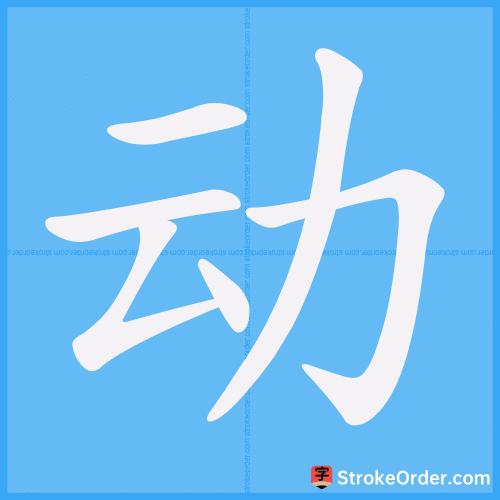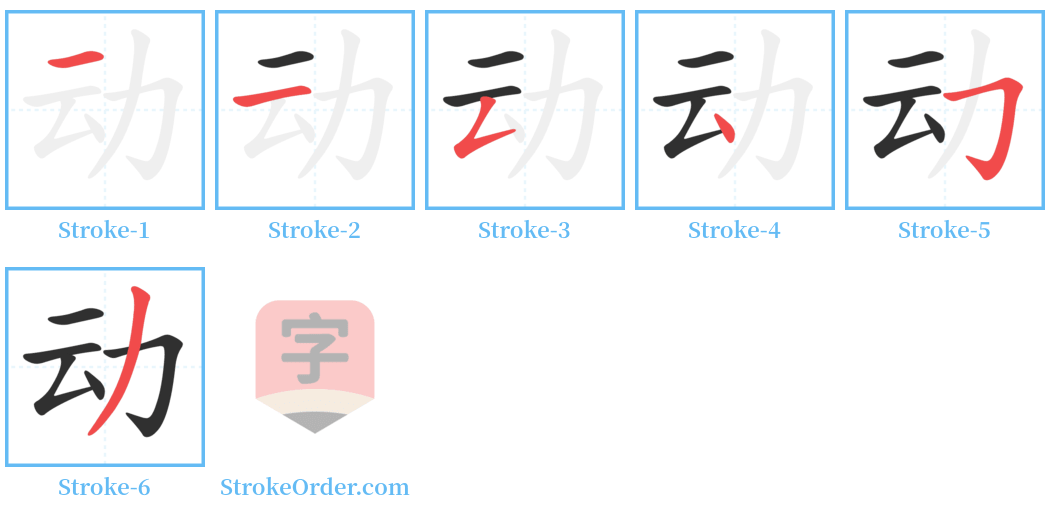动 Stroke Order
Animated Stroke Order of 动

Stroke Order Diagrams for 动

Step-by-Step Handwriting Guide for 动

Learn to Write Chinese Characters with Video Tutorials
Watch the video of writing the Chinese character "动", learn the correct stroke order (笔顺) of the character "动", and master the standard way of writing the character "动".
Free Printable Handwriting Practice with Stroke Order: 动
Printable Writing Practice Worksheet of "动" in Portrait Orientation (Tian Zi Ge)

Printable Writing Practice Worksheet of "动" in Landscape Orientation (Tian Zi Ge)

Information of 动
Pinyin
dòng
Radical
力
Strokes
6 strokes
Usage
★★★★★
Definition
to use / to act / to move / to change
动
dòng
[动]
【本义】: 行动; 发作
1. 改变原来位置或脱离静止状态,与“静”相对。
(Change original position or leave a static state, opposite to "static.")
2. 使开始发生。
(Cause to start happening.)
3. 使用。
(Use.)
4. 使起作用或变化,使感情起变化。
(Cause to take effect or change, make emotions change.)
5. 吃(多用于否定式)。
(Eat, often used in the negative form.)
6. 非静止的。
(Non-static.)
7. 可变的。
(Variable.)
8. 行为。
(Behavior.)
9. 常常。
(Frequently.)
动
dòng
1. 改变原来位置或脱离静止状态,与“静”相对:变~。波~。浮~。振~(物体通过一个中心位置,不断作往复运动。亦称“振荡”)。震~(①颤动或使颤动,如“门窗~~了一下”;②重大事情或消息使人心不平静,如“~~全国”)。
(Change original position or detach from a static state, opposite to "static": changing; wave; floating; vibrating (an object constantly moves back and forth through a central position, also known as oscillation). Shock (1. Shake or cause to shake, as in "the door and windows shook slightly"; 2. Significant events or news disturb people's peace, as in "shaking the nation.")
2. 使开始发生:发~。
(Cause to start happening: set into motion.)
3. 使用:~用。~武。~问(客套话,请问)。
(Use: utilize; martial use; please ask (polite expression).)
4. 使起作用或变化,使感情起变化:感~。~人心弦。娓娓~听。~容。
(Make effective or change, cause feelings to change: touching; stir people's hearts; speak charmingly; affect an atmosphere.)
5. 吃(多用于否定式):这几天不~荤腥。
(Eat (often in negative form): I haven't eaten meat these days.)
6. 非静止的:~画。
(Non-static: moving picture.)
7. 可变的:~产。
(Variable: adjustable output.)
8. 行为:举~。~作。
(Behavior: raise action; conduct.)
9. 常常:~辄得咎。
(Frequently: often leads to blame.)
动
dòng
[动]
【本义】: 行动; 发作
1. 同本义 ([En.] act; break out; show effect)
(Same original meaning: act; break out; show effect.)
2. 摇动,震动,移动。与“静”相对 ([En.] move; stir)
(Shake, vibrate, move. Opposite to "static.")
3. 动摇; 震撼 ([En.] wave; shake; shock)
(Waver; shock.)
4. 触动感应; 感动 ([En.] response; move; touch)
(Affect emotions; touch.)
5. 萌动 ([En.] bud; germinate)
(Sprout.)
6. 做; 操作; 劳作 ([En.] do; operate; work)
(Do; operate; work.)
7. 使用 ([En.] use)
(Use.)
8. 改变 ([En.] change; alter)
(Change; alter.)
9. 〈方〉∶吃 ([En.] eat)
(Local dialect for eat.)
动
dòng
[副]
动不动,常常
(Frequently, often.)
1. 例: 曹公,豺虎也,挟天子以征四方,动以朝廷为辞。
(Example: Cao Gong, a ferocious figure, uses the emperor to recruit from all sides, often using the court as an excuse.)
steadfastly stand on one's ground / remain firm / remain unmoved / standing erect and unshakable
Input Method for 动
Pinyin
dong4
Wubi
fcln|fcet
Cangjie
miks
Zhengma
bdzy
Four Corner
14727
Unicode
U+52a8
Same Pronunciation Characters